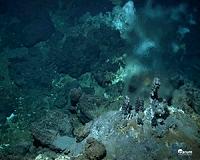| . |  |
. |
Washington (AFP) Oct 12, 2010 The United States on Tuesday lifted a ban on deepwater drilling in the Gulf of Mexico imposed after the BP oil spill, but set operators tough new safety conditions, officials said. "We have decided it is now appropriate to lift the suspension on deepwater drilling for those operators that are able to clear the higher bar that we have set" for safety, Interior Secretary Ken Salazar said. President Barack Obama ordered a six-month freeze on deepwater offshore oil drilling in the Gulf of Mexico shortly after a blowout on the BP Deepwater Horizon undersea well that killed 11 rig workers and sparked the worst oil disaster in US history. The moratorium was due to expire at the end of next month. The new rules, which were laid out by the Interior Department two weeks ago, toughen up companies' obligations on drilling and workplace safety, well containment and spill response, said Salazar. Key among the tough new rules is an obligation for the CEO of any company wishing to drill in deep water to "certify that the rig has complied with all new and existing rules," he said. Executives from the companies involved in the BP-leased well that blew out have blamed each other for the accident which happened some 50 miles (80 kilometers) off the coast of Louisiana. But even if the moratorium was being lifted, deepwater drilling was not expected to resume soon, said Michael Bromwich, director of the Bureau of Ocean Energy Management, Regulation and Enforcement (BOEM). Oil and gas companies need time to implement the new rules and draw up applications for offshore leases "and it will obviously take us time to review those applications and do due diligence," said Bromwich. American Petroleum Institute president Jack Gerard welcomed the lifting of the drilling ban but worried that "a de facto moratorium could be created by delays in the processing and approval of permits, which will reduce production, government revenues and American jobs." Billy Nungesser, president of Plaquemines Parish in Louisiana, where residents were hard hit by the moratorium on drilling, was relieved that the ban had been lifted, but voiced concern that a slow-moving permitting process would end up smothering the local oil and gas industry. "We hope that the new regulations and new policies will make drilling safer for both the people working offshore and the environment in the future. "At the same time, we hope the regulations will not delay the permitting process for deepwater or other drilling, which ends up smothering the industry," Nungesser said. Republican Congressman Darrell Issa also urged the government to "avoid a de facto moratorium-by-regulatory-delay ... that would be just as damaging to the Gulf economy as a blanket moratorium." A study in July estimated that a six-month moratorium would cost more than 8,000 jobs in Florida, Alabama, Mississippi, Louisiana and Texas and wipe out nearly 2.1 billion dollars in economic activity in the Gulf states. Louisiana Democratic Senator Mary Landrieu, who has called the moratorium a "reckless" move that endangered the environment and jobs, welcomed Tuesday's announcement as "a step in the right direction." "But it must be accompanied by an action plan to get the entire industry in the Gulf of Mexico back to work," including an acceleration of the permitting process, she added. Environmental groups, meanwhile, said the ban had been lifted too soon. "Scientists haven't even assessed the full ecological impact of the BP disaster and yet the government is in a rush to allow oil companies to get back to drilling. It is irresponsible to say the least, reckless at worst," said Greenpeace USA director Phil Radford. Peter Lehner, executive director of the Natural Resources Defense Council, said the moratorium should have stayed in place. "To ensure a disaster like this never happens again, we must know what caused it in the first place. We're still waiting for that answer and until we get it, the moratorium should remain in place," he said. The Sierra Club said the moratorium had been only a temporary fix, and the real solution was to wean the United States off oil. "The only way to make sure we don't see another drilling disaster is to end our dependence on oil," said Sierra Club president Michael Brune. "The BP disaster was a wake up call, but our leaders keep hitting the snooze button," he said.
Share This Article With Planet Earth
Related Links Water News - Science, Technology and Politics
 New Deep-Sea Hot Springs Discovered In The Atlantic
New Deep-Sea Hot Springs Discovered In The AtlanticMunich, Germany (SPX) Oct 13, 2010 Scientists from the MARUM Center for Marine Environmental Sciences and the Max Planck Institute for Marine Microbiology in Bremen on board the German research vessel Meteor have discovered a new hydrothermal vent 500 kilometres south-west of the Azores. The vent with chimneys as high as one meter and fluids with temperatures up to 300 degrees Celsius was found at one thousand metres water ... read more |
|
| The content herein, unless otherwise known to be public domain, are Copyright 1995-2010 - SpaceDaily. AFP and UPI Wire Stories are copyright Agence France-Presse and United Press International. ESA Portal Reports are copyright European Space Agency. All NASA sourced material is public domain. Additional copyrights may apply in whole or part to other bona fide parties. Advertising does not imply endorsement,agreement or approval of any opinions, statements or information provided by SpaceDaily on any Web page published or hosted by SpaceDaily. Privacy Statement |